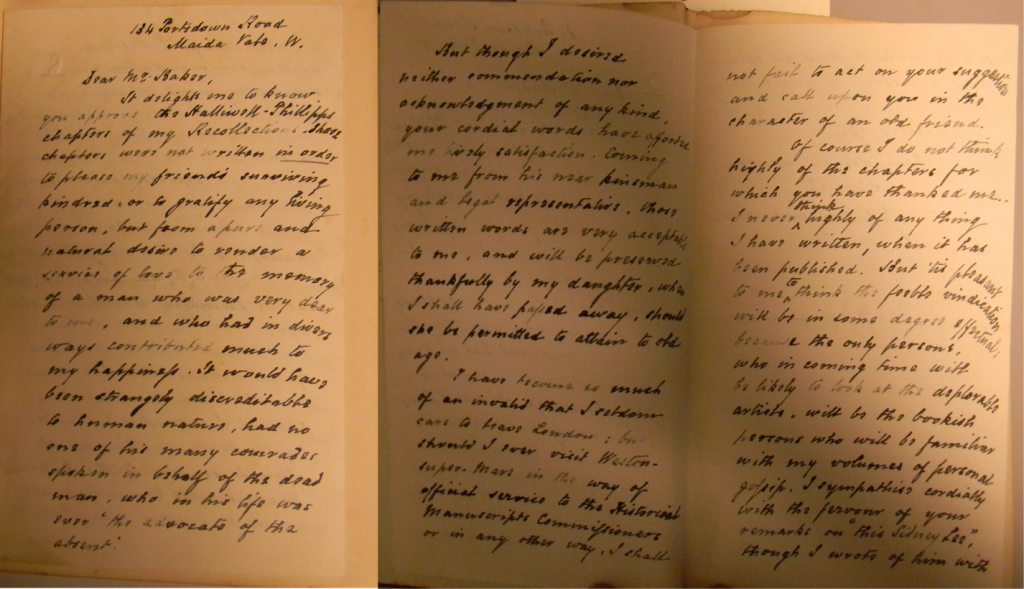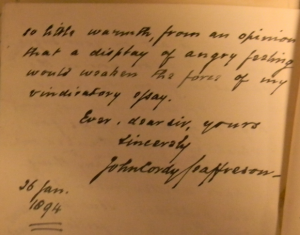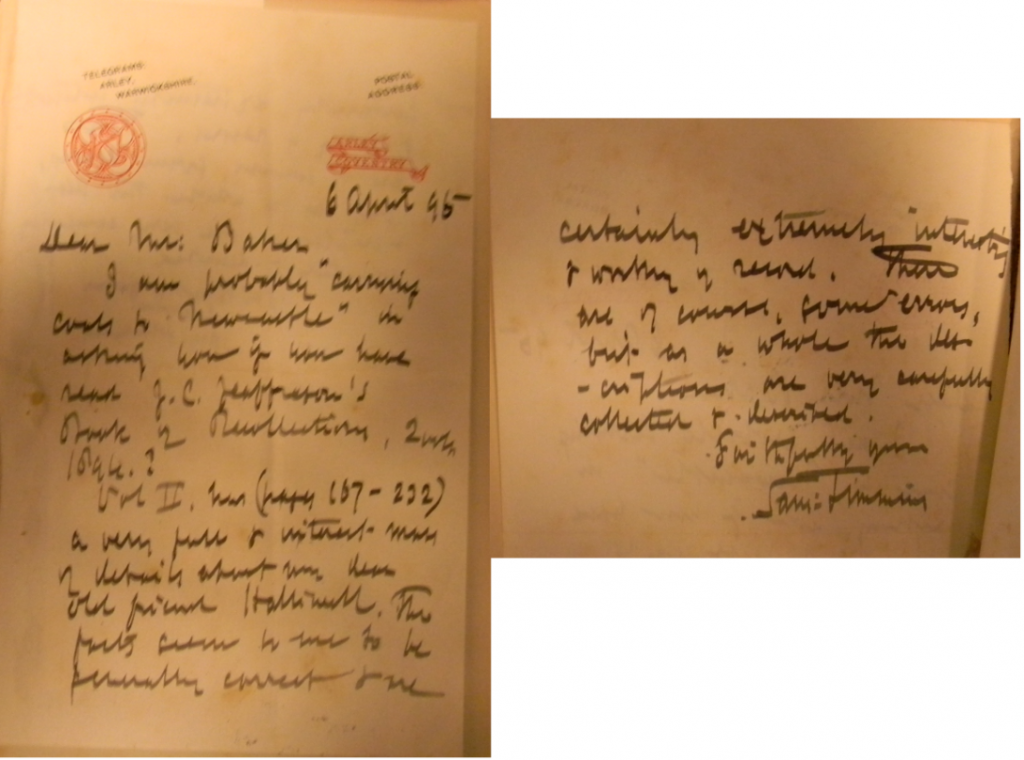Editor’s note: this post was researched and written by Book Traces @ UVA project assistant Nitisha Potti.
With the advent of digital media, everybody has become a Biographer or an Author or a Blogger. Given that researching about almost anybody’s life has become very easy with vast volumes of knowledge just a click away, how much can you trust these sources? And when you write something without thorough research on your part, then you end up making a mistake or an error in reproducing facts and then you end up receiving flak from every Tom, Dick and Harry who has read (or not read but just wants to take advantage of the stage set up for ridiculing someone) within milliseconds. I wonder if the person at the receiving end of all this ridicule has ever wondered, would I have received so much criticism had I been a writer in the 19th century or early 20th century, or would anyone have even noticed that I made a small mistake had I been a writer in those days?
Being a blogger myself, all these questions which were always there in some remote corner of my head got answered when I came across this very interesting artifact while I was working with Book Traces @ UVA in the form of a letter, which was written in 1894 by Mr. John Cordy Jeaffreson. Mr. Jeaffreson is also the author of the book I found this letter in which was pasted on the first page of the book. The book is titled A Book Of Recollections and is the first of the two volumes with the same title, published in 1894. The letter was addressed to Mr. Baker, who at that time might have possessed this book. Another interesting insertion was found pasted on the back page of the book which was a letter addressed to Mr. Baker by Mr. Sam Timmins in 1895; this letter I admit was very tedious to decipher.
Mr. Jeaffreson starts the first letter like this: “It delights me to know you approve the Halliwell Phillipps chapters of my Recollections.” The letter then goes on to describe the relation its writer shared with Mr. Halliwell and that he did not write the chapter to please anyone but he writes and I quote – “It would have been strangely discreditable to human nature, had no one of his many comrades spoken in behalf of this dead man, who in his life was ever ‘the advocate of the absent.’” One can clearly make out that Mr. Baker was related to Mr. Halliwell after reading Mr. Jeaffreson’s thanks to him – “your cordial words have afforded me [illegible] satisfaction coming to me from his [i.e. Mr. Halliwell’s] near kinsman and legal representative.” The part of the letter that intrigued me the most was “I sympathize cordially with the fervor of your remarks on ‘this Sidney Lee,’ though I wrote of him with so little warmth, from an opinion that a display of angry feeling would weaken the force of my vindicatory essay.” You can sense some resentment from both the parties towards Mr. Sidney Lee. Now, after examining the contents of the second letter that was pasted in book what caught my eye was “Vol II. has (pages 167-232) a very full of [illegible] of details about our dear old friend Halliwell.”
At this point there were many questions popping in my head—Why Mr. Jeaffreson and Mr. Baker shared this resentment towards Mr. Lee? What is the relation between Mr. Baker and Mr. Halliwell? How do Mr. Timmins and Mr. Halliwell know each other? And the most basic question who are all these people mentioned in the letters and why are they communicating with each other? So I decided to start my quest for answers from Google.
Turns out Mr. Halliwell was the noted English Shakespearean scholar James Orchard Halliwell-Phillipps. He has written many volumes about the life of Shakespeare and many literary scholars and critics have admired his work because of the extensive labor and the passion that went into his works. Many books have been written critiquing the work of Mr. Halliwell. He created Shakespeare collections, acquired many copies of plays, and arranged clippings from other early printed works in scrapbooks alongside his own notes. He also produced facsimiles of the quartos, so that he might have accurate copies of editions he could not purchase.
Mr. Halliwell’s life was dogged by controversy. While researching about Mr. Halliwell I stumbled upon this conjecture surrounding him during 1845 when Mr. Halliwell was, according to Wikipedia, “excluded from the library of the British Museum on account of the suspicion concerning his possession of some manuscripts which had been removed from the library of Trinity College, Cambridge. He published privately an explanation of the matter in 1845.” This piece of information prompted me into reading the pages suggested by Mr. Timmins in his letter and look for some clues on the matter at hand. On page 191 of Vol. 2 of his book A Book Of Recollections Mr. Jeaffreson writes “Unfortunately, the writer of the notice of James Orchard Halliwell in the Dictionary of National Biography was misinformed in respect to a most important point of the story, which he reproduced to the grave discredit of the Shakespearian scholar. Speaking of the scandalous charge against young Halliwell the writer of the deplorable memoir observed,” and then he quotes the snippet from the article he claims deplorable which was published a year after the death of Mr. Halliwell in 1889. To worsen things, this memoir was the first time Mr. Halliwell’s widow and his daughters came to learn about this scandalous affair. On page 192, Mr. Jeaffreson writes that Mrs. Halliwell wrote to the author of this memoir that the order excluding Mr. Halliwell was soon rescinded. Upon being thusly informed the author of the memoir went to the British Museum for official evidence on the point wherein he learnt that Mrs. Halliwell was in fact correct. Mr. Jeaffreson then went on to write, “The consequences of this worst of several mistakes in the faulty memoir of Halliwell-Phillipps were, are, and will always remain lamentable.” Mr. Jeaffreson uses rather harsh words to describe this memoir, calling it “The worst of the Memoir’s Several Errors.”
I then tried to find who the writer of the debatable memoir was as the details of the memoir were clearly mentioned in the book by Mr. Jeaffreson, and it turns out it was Mr. Sidney Lee. This therefore puts the resentment of Mr. Jeaffreson towards Mr. Lee in perspective. The next step was to find out the relationship between Mr. Baker and Mr. Jeaffreson. Googling threw light on this as well: according to Folgerpedia, Mr. Ernest E. Baker was the nephew and executor of Mr. Halliwell. Mr. Timmins, who wrote the second letter, according to many online sources was credited with finding many sources of information for the books written by Mr. Halliwell. Therefore, it is safe to conclude that being closely involved with Mr. Halliwell was the reason why Mr. Baker and Mr. Timmins were so interested in the chapters written by Mr. Jeaffreson about Mr. Halliwell.
To summarize: Mr. Halliwell Phillpps, a noted Shakespearean scholar, was wrongly accused of stealing manuscripts from Trinity College due to which he was excluded from using the college library, which was rescinded in light of the evidence produced by Mr. Halliwell proving his innocence. But, the author of the memoir about Mr. Halliwell i.e. Mr. Lee did not reproduce this incident faithfully due to lack of information or negligence on his part (nobody can tell). He never mentioned any retraction of the exclusion, which according to Mr. Jeaffreson tainted the reputation of Mr. Halliwell. Also according to Mr. Jeaffreson there were other parts of the memoir, for instance the part written about Mr. Halliwell’s family members, which was totally incorrect; Mr. Jeaffreson calls the memoir “Strangely inaccurate.” Also, Mr. Halliwell’s friends who knew about the “vile charge” as Mr. Jeaffreson puts it were furious because up until the memoir was published Mr. Halliwell’s wife and daughters knew nothing about it and suddenly the affair was splashed across the memoir in a highly inaccurate manner. In due course, some respite was felt by Mr. Baker and Mr. Timmins who wrote a letter to Mr. Baker suggesting he read Mr. Jeaffreson’s version of the entire scandalous affair, after reading the vindicatory account of the entire matter written by Mr. Jeaffreson. The first letter hints at gratitude felt by Mr. Baker towards Mr. Jeaffreson for his truthful account. The second letter was written in 1895 and it is safe to say that Mr. Baker had already read the book by then and had a warm exchange of letters with the author before Mr. Timmins wrote the letter to Mr. Baker. Nevertheless Mr. Baker saved the second letter in this book which shows the strong relation he shared with his uncle and his gratification on reading Mr. Jeaffreson’s account, that he wanted to save anything related to the book in the book itself.
My point that I started at the beginning of this account being: no matter what century you are in, if you make a literary mistake concerning facts, you will get criticized, showing that only the intensity of the criticism and the speed at which you may receive it changes with changing times.
Works Cited:
Jeaffreson, John Cordy. A Book Of Recollections. vol. 1, London, Hurst and Blackett, Limited, 1894.
Jeaffreson, John Cordy. A Book Of Recollections. vol. 2, London, Hurst and Blackett, Limited, 1894.
Lee, Sidney. Dictionary of National Biography. vol. 24.
“J. O. Halliwell Phillips.” Wikipedia.
“J. O. Halliwell Phillipps.” Folgerpedia.
“James Orchard Halliwell-Phillipps.” Shakespeare Collected.




